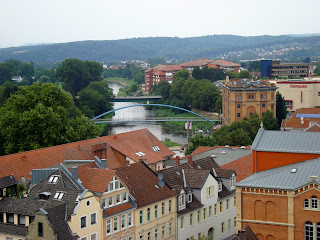It's been a long time since I have posted anything on this blog. There are little ideas buzzing around in my head like mosquitoes at the lake house and they make my brain itch.
Here are some fuzzy, jet-lag laced thoughts on returning from a trip back to the U.S.:
Being away from the U.S. and then coming back makes me see it differently than I ever could have if we had never moved. It's like listening to yourself talk on video - the microphone doesn't lie, but it's not how your voice sounds in your head.
I just finished reading a book on loan from Dizzy's library-of-books-mostly-about-Africa called
The Soccer War, by Polish journalist Rysard Kapuscinski. The author quotes a book by Levi-Strauss which is about his work as an ethnographer in Brazil. We don't have that much in common. He was Frenchman trekking around the jungles of Brazil; I am American riding a bike on the paved and quiet streets of Hannover. While my experience of living abroad is incredibly more tame and comfortable, I identified with this quote:
"Why has he come here? With what hopes or what objectives? ... does it result from a more radical choice, which implies that the anthropologist is calling into question the system in which he was born and brought up? ... Through a remarkable paradox, my life of adventure, instead of opening up a new world to me, had the effect rather of bringing me back to the old one, and the world I had been looking for disintegrated in my grasp." Levi-Strauss goes on to describe how, as he found the new people and landscapes, they were kept getting replaced in his mind by images from his homeland, from the culture he thought he had left behind.
After a month in the U.S., there are some things I really appreciate: the friendliness of strangers, the grocery store cashier who makes a joke as I check out, the sound of crickets and cicadas on a summer night, the shapes and colors or faces that all look different, drinking fountains, goofy yard art.
There are the things that bother me: vast suburban acres of asphalt and strip malls, so many streets where it's dangerous to be a pedestrian, patriotism used as a marketing ploy (has anyone seen the "close shave America, close shave Barbasol" commercial?), obesity, mosquitoes.
And those things I just never really noticed before: air conditioning and big cars and huge appliances and free public bathrooms.
I have another quote for you. I watched a movie on the plane called
Night Train to Lisbon. It was ok, a little slow maybe, but some lines caught my attention: "When we leave a place, we stay there even though we go away. We travel to ourselves when we go back to a place where we have covered a stretch of our lives."
Maybe that's what home feels like - little bits of who I am and why I am that way, all scattered around. It felt like home at the house where I grew up in Lisle, IL. Saint Paul also felt like home. And I'm at home now in Hannover.

























